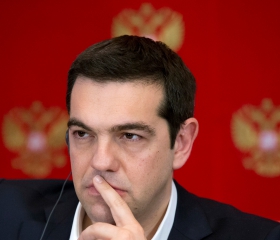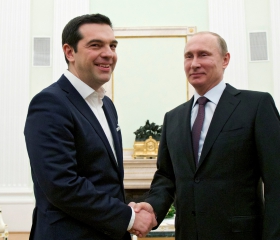With the ongoing crisis in relations with the European Union, any kind of high-level bilateral meeting between Russian representatives and individual EU countries is bound to attract heightened, and in some cases disproportionately high, levels of scrutiny from both Russian and Western media, as well as from the expert community. This, in turn, leads to widespread speculation and conjectures that have little to do with the actual agenda of the talks. A perfect example of this is the April 8–9, 2015 visit to Moscow of Greek Prime Minister Alexis Tsipras.
With the ongoing crisis in relations with the European Union, any kind of high-level bilateral meeting between Russian representatives and individual EU countries is bound to attract heightened, and in some cases disproportionately high, levels of scrutiny from both Russian and Western media, as well as from the expert community. This, in turn, leads to widespread speculation and conjectures that have little to do with the actual agenda of the talks. A perfect example of this is the April 8–9, 2015 visit to Moscow of Greek Prime Minister Alexis Tsipras.
In the weeks running up to the Greek delegation’s arrival in the Russian capital word in the media was that the main topic of discussion at the meetings would be Russia providing financial aid to Greece, whose newly elected government was faced with the threat of default after it had successfully lobbied for a review of its loan agreements with its European creditors and the International Monetary Fund (IMF). Many pointed to the fact that Greece was set to pay its latest tranche, worth 459 million euros, to the IMF the day after President Putin and Prime Minister Tsipras were scheduled to meet. As it turned out, Greece managed to come up with the money without any help from Russia, and the issue of Russia providing loans to Greece did not even appear on the agenda of the Moscow talks. Both sides are well aware that Russia, which is feeling the pressure of low oil prices and sanctions from the West, does not have sufficient funds to refinance Greece’s debt (for reference, Greece’s public debt is comparable in size to Russia’s international reserves).
Another topic raised at the meeting between the two leaders that was expected to be given greater attention was the Russian food embargo imposed on EU countries, including Greece, in response to the Western sanctions. As agricultural products make up the bulk of Greek exports to Russia, the country was hit particularly hard by the “sanctions war”. It should be noted, however, that while Greek suppliers saw Russia as a potential market, it was never one of Greece’s main export partners [1]. Therefore, the consequences of the Russian embargo for Greece are mainly of a local dimension (for example, the regional unit of Imathia, which relied heavily on exports of peaches to Russia, suffered significantly), with the total losses for Greek farmers amounting to the relatively small amount of 30–35 million euros. President Putin made Russia’s position on the possible cancellation of the embargo on Greek products very clear when he stated in a press conference that Russia “cannot make exceptions for individual European countries”.
The Kremlin meeting resulted in just two agreements being signed – a plan of action for 2015–2016 and a statement in honour of the 70th anniversary of Victory Day (May 9). In addition, a memorandum was signed on making 2016 the Year of Russia in Greece and the Year of Greece in Russia. So, nothing sensational happened as a result of the high-level meeting, prompting many analysts (especially in Western Europe) to question the success of the Greek premier’s Moscow visit. German broadcaster Deutsche Welle was particularly critical, publishing an opinion piece on its website entitled “Tsipras’ Visit to Moscow was a Flop”. The article notes that his attempt to “jeopardize solidarity with the EU to gain a new friend and helper in Moscow” was unsuccessful, and now he must return to the negotiating table with its triumvirate of international creditors (the European Commission, the European Central Bank and the International Monetary Fund). In our opinion, these assessments are incorrect and do not take into account the realities of Russia–Greece relations.
Western (and occasionally Russian) observers have developed a persistent stereotype that depicts Greece as a strategic partner of Russia, and in some cases even as its “Trojan horse” in the European Union. To be sure, despite the current standoff between Russia and the European Union over the Ukrainian crisis, Russia’s bilateral relations with Greece have developed without conflict, with the two countries adopting similar positions on a number of issues related to international security, and the mid-2000s being marked by active cooperation in many areas, including energy, tourism, investment and Russian arms supplies to Greece. And while Greece may have joined in with the anti-Russian sanctions in 2014 as a way of showing solidarity with other EU countries, the centrist government led by Antonis Samaras which remained in power until January 2015 repeatedly expressed doubts as to viability of such an approach, arguing that the sanctions were a “double-edged sword”.
Still, Russian-Greek relations have clearly lost their dynamic over the past five years, with many experts believing that they were in a state of “deep freeze” in 2009–2011 as a result of Greece’s economic woes and the pro-American government of Georgios Papandreou [2]. Admittedly, the next few years may have been marked by a growth in mutual trade and tourism, but they brought nothing new to bilateral relations between the two countries: military-technical cooperation, which came to an end in 2009, has not been renewed and negotiations on the participation on Russian companies in the privatization of Greek assets proved unsuccessful. The 2014 sanctions and subsequent recession in Russia, which caused trade turnover to fall by 40 per cent and the number of Russian visitors to Greece to drop by 15 per cent, was yet another blow to relations between the two countries (both links in Russian).
Given this state of affairs, both countries are faced with the task of giving new impetus to the development of these relations. And this is precisely what Alexis Tsipras focused on during his visit to Moscow, both at the joint press conference he gave with President Vladimir Putin on April 8 and in the lecture he gave later that afternoon at MGIMO University. In his lecture, Mr. Tsipras stressed that Russian–Greek cooperation should once again take on a multidimensional character and cover the areas of international security, economics and humanitarian aid.
With respect to security issues, Mr. Tsipras made two important observations. The first of these was that the main threat currently faced by the European Union does not come from Russia, but rather from the Middle East and Northern Africa. This is particularly troublesome for Greece, as it sits next door to two hot spots of instability – Libya and Syria. Resolving these issues is in the interests of both Russia and the European Union and should be a focus of dialogue between the two.
The second observation relates to the crisis in Ukraine. In keeping with the general foreign policy line of the European Union, Greece insists that both sides adhere to the Minsk Agreements as the basis for de-escalating the conflict. The country’s leadership has expressed its concern with regard to the situation in Mariupol, which, significantly, is home to a large Greek population. At the same time, Mr. Tsipras spoke out once again against the sanctions as a method of applying pressure on Russia with regard to the situation in Ukraine, calling for the mutual cancellation. As far a Greek diplomacy is concerned, Europe is in need of a new security architecture, one that should be drawn up not in isolation from Russia, but rather in collaboration with it. The OSCE, whose potential is currently being underused, could play a central role in this. The initiatives suggested by Mr. Tsipras are of particular importance: the Greek leader has openly stated that he does not agree with, and will seek a review of, the hard-line approach to Russia that dominates in the European Union. This does not mean that the Greek government will enter into an all-out conflict with Brussels over the matter (quite the opposite, Mr. Tsipras has emphasized that Greece is an integral part of the European Union), but the very fact that such statements can be heard gives us hope that the European Union’s position with regard to Russia could be starting to change.
Despite the lack of high-profile results in terms of economic cooperation, Russia and Greece has been able to find areas of common interest, most significantly in the energy sector. While he is far from enamoured with the name of the Turkish Stream project (anti-Turkish sentiment is still strong in Greek political discourse), Mr. Tsipras nevertheless noted that the idea of building a gas pipeline from Russia to Turkey is of great interest to Greece both in terms of satisfying its own natural gas requirements and from the point of view of maximizing profits as a result of its transit through Greece to neighbouring countries. Support for the project, which came about after the South Stream project was canned in December 2014, is in line with the overall energy strategy of the Greek authorities, which aims to make the country a major gas hub in Southeast Europe. At the same time, however, the Greek Prime Minister has stated that the country will act in strict compliance with EU legislation and, in addition to supplies of Russian gas, is planning on developing joint projects with other potential exporters of natural gas on the European markets, namely, Azerbaijan and Cyprus.
Contrary to predictions, the negotiations did not touch upon the issue of Greece receiving discounts on Russian gas, although we cannot rule out the possibility that if construction of the Turkish Stream gets the green light (the situation is still unclear), Greece will insist on lower prices in return for its participation in the project.
Another important area of cooperation, particularly for Greece, is tourism. Obviously, the country would like to restore the record tourist flows of 2013. However, since all possibilities of simplifying the Schengen visa regime for Russian citizens have already been exhausted, hopes are pinned on Greece’s advertising campaign as a tourist destination. This will be helped in no small measure by the introduction of the respective years of Russian and Greek culture and the increased number of flights between the two countries. Also on the agenda is the issue of establishing investment relations, in particular with regard to the possible creation of joint food production enterprises (which could partially compensate for Greece’s losses as a result of Russia’s food embargo) and the participation of Russian companies in the privatization of Greek assets. All of these areas are currently under discussion, and we may see some more concrete proposals closer to the St. Petersburg International Economic Forum (June 18–20, 2015), which a Greek delegation is set to attend.
Understandably, it is difficult to judge whether Alexis Tsipras’s visit to Moscow represents a reset of Russia–Greece relations based on the largely demonstrative statements made in Moscow; too much uncertainty remains with regard to the matters discussed during the negotiations. But the very fact that two countries have entered into a dialogue on a number of issues against the background of strained relations between Russia and the European Union, is a positive sign.
1. Kuznetsov A.V. The Transformation of the Structure of Greece’s Foreign Trade in the Context of the Economic Crisis. In Modern Greece in the Global Economy and Politics. Moscow: IMEMO RAN, 2015, p. 37.
2. Triantaphyllou D. Greece // EU – Russia Watch 2012. Tartu, 2012, p. 62.






